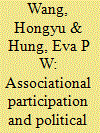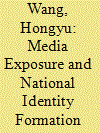|
|
|
Sort Order |
|
|
|
Items / Page
|
|
|
|
|
|
|
| Srl | Item |
| 1 |
ID:
114084


|
|
|
|
|
| Publication |
2012.
|
| Summary/Abstract |
Spatial distribution is an important dimension of research into the development of high technology (hi-tech) industries due to the knowledgeintensive features of these industries. This paper separates the agglomeration effects and the spillover effects, and analyzes the evolution of the spatial distribution of China's hi-tech sub-industries from themid-1990s by combining the geographic concentration index (locational Gini coefficient, concentration ratio) and spatial econometrics (Moran's I). The results reveal that, firstly, most hi-tech subindustries tend to be concentrated in the eastern coastal regions of China, while there are significant spillover effects from the eastern coastal regions to the central regions. The development model based on national hi-tech industrial zones is the primary reason for industrial agglomeration, and it is the result of both government direction andmarket rules. Secondly, on the macro-level, there has been a certain amount of geographical concentration and interregional division of labor among China's hi-tech industries, but there is low intraregional specialization. Furthermore, in contrast to the findings of most of previous studies, the distribution ofChina's hi-tech industries and that of its innovation capacity share similar evolutionary trends, although they do not completely overlap.
|
|
|
|
|
|
|
|
|
|
|
|
|
|
|
|
| 2 |
ID:
160113


|
|
|
|
|
| Summary/Abstract |
Using survey method, this study compares the relative importance of exposure to Chinese media, pro-China local media, pro-democracy local media, and new media (e.g., Weibo, Facebook) on the building of national identity among Macau college students. We argue that the effect of media exposure on national identity formation is not uniform, owing to the political leanings of the media and the platform on which the information is transmitted (new media vs. traditional media). We find that getting news about China on Facebook is the most important predictor of the formation of national identity among college youth in Macau, followed by getting news on Weibo and exposure to traditional Chinese media. Conversely, exposure to pro-democracy local media and frequent use of Facebook exert a negative effect on national identity building among college youth in Macau. Positive sentiment toward China and trust in the central government act as mediators and fully explain the relationship between exposure to traditional pro-China media and national identity but cannot explain the positive effect of exposure to new media on national identity formation.
|
|
|
|
|
|
|
|
|
|
|
|
|
|
|
|
|
|
|
|
|